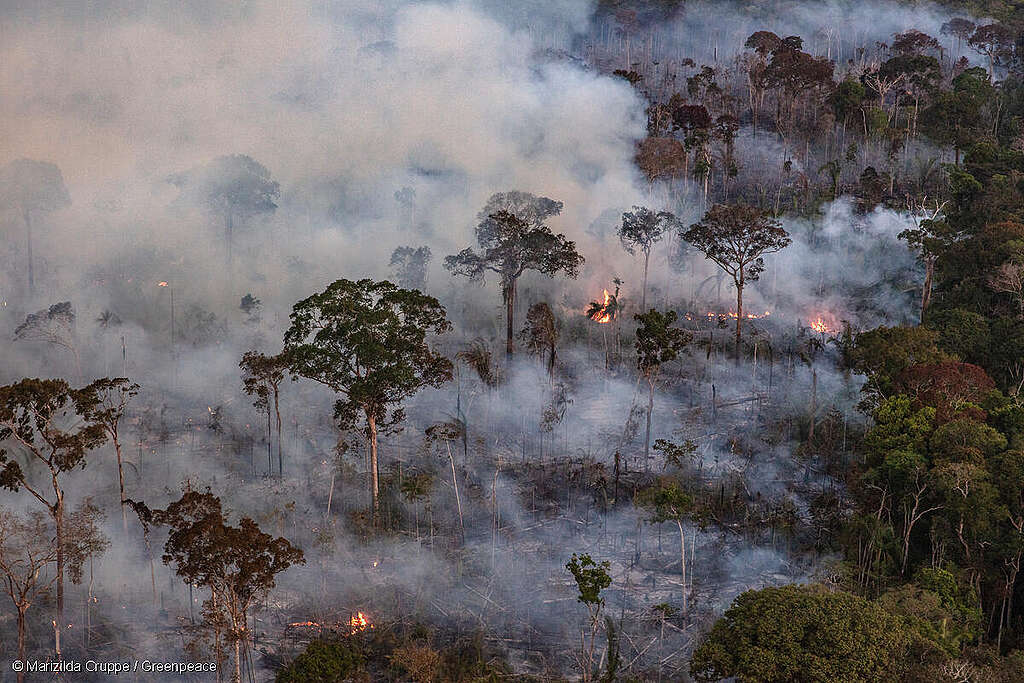- Joined
- Jan 17, 2010
- Messages
- 7,976
- Reaction score
- 10,093
"The Amazon is in its worst state of the last 50 years.”
ByTrisha Mukherjee
September 10, 2024, 8:42 AM

LONDON -- Wildfires in the Amazon are choking swaths of Brazil, Bolivia and Ecuador with smoke, leading to evacuations, school closures, canceled flights and a dire threat to plant and animal life in the region in what officials say is thought to be the worst fires in 20 years.
An estimated 20% of the Brasilia National Forest burned just last week and officials have launched a probe into suspected arson as residents of the nearby Brazilian capital city of Brasilia reported coughs, stinging eyes and scratchy throats, according to park officials.
In Bolivia’s capital city of La Paz, many schools held virtual classes and flights to and from the region were delayed and canceled. Elsewhere, in the provinces of Beni, Santa Cruz and Pando, many farmers and indigenous Bolivians have evacuated their land as fires continued. More than 3 million hectares of land have already burned in Bolivia this year.

In Ecuador, the government deployed an anti-fire helicopter and specialized brigades to contain a wildfire that has lasted almost two weeks.
The wildfire season in the Amazon region used to last three months from August to October. Now, it stretches on for six months, said Efrain Tinta Guachalla, a socio-territorial investigator at Fundación Tierra, a Bolivian NGO dedicated to sustainable rural development.
Guachalla attributes the fires to a growing amount of farmland, often for soy and cattle, and the deforestation that occurs because of this expansion. Deforestation causes the land to dry out due to a rise in temperatures and decreasing rainfall, causing a greater risk of fires in the surrounding forests.
“The fires are out of control,” he said. “The land is full of scars from the burning.”
While occasional wildfires in Europe and the American West are normal considering the climate, he continued, the humid Amazon is never meant to burn. He says that rainforest flora and fauna are being wiped out at unprecedented rates.
“The fires in California or the fires in Europe, those aren’t the same as the fires in South America. There’s an enormous difference -- the loss of biodiversity,” said Guillermo Villalobos, a political scientist focusing on climate science at Bolivian nonprofit Fundación Solon. “Forests like the Amazon are historically tropical forests, meaning they’ve never burned, they’ve never coexisted with the fire. This is terribly tragic for the ecosystem and the world. The Amazon is in its worst state of the last 50 years.”

Over ten thousand species are at high risk of extinction, researchers say, in large part due to deforestation, according to a report by the Science Panel of the Amazon.
As climate change and global demand for agricultural products increase, Villalobos thinks the fires are only going to get worse as more land is cleared for farming, raising the risk of wildfires.
“We’re in an interminable loop,” he said. “A point of no return.”
https://abcnews.go.com/International/control-fires-ravage-amazon-region/story?id=113545475
ByTrisha Mukherjee
September 10, 2024, 8:42 AM
LONDON -- Wildfires in the Amazon are choking swaths of Brazil, Bolivia and Ecuador with smoke, leading to evacuations, school closures, canceled flights and a dire threat to plant and animal life in the region in what officials say is thought to be the worst fires in 20 years.
An estimated 20% of the Brasilia National Forest burned just last week and officials have launched a probe into suspected arson as residents of the nearby Brazilian capital city of Brasilia reported coughs, stinging eyes and scratchy throats, according to park officials.
In Bolivia’s capital city of La Paz, many schools held virtual classes and flights to and from the region were delayed and canceled. Elsewhere, in the provinces of Beni, Santa Cruz and Pando, many farmers and indigenous Bolivians have evacuated their land as fires continued. More than 3 million hectares of land have already burned in Bolivia this year.

In Ecuador, the government deployed an anti-fire helicopter and specialized brigades to contain a wildfire that has lasted almost two weeks.
The wildfire season in the Amazon region used to last three months from August to October. Now, it stretches on for six months, said Efrain Tinta Guachalla, a socio-territorial investigator at Fundación Tierra, a Bolivian NGO dedicated to sustainable rural development.
Guachalla attributes the fires to a growing amount of farmland, often for soy and cattle, and the deforestation that occurs because of this expansion. Deforestation causes the land to dry out due to a rise in temperatures and decreasing rainfall, causing a greater risk of fires in the surrounding forests.
“The fires are out of control,” he said. “The land is full of scars from the burning.”
While occasional wildfires in Europe and the American West are normal considering the climate, he continued, the humid Amazon is never meant to burn. He says that rainforest flora and fauna are being wiped out at unprecedented rates.
“The fires in California or the fires in Europe, those aren’t the same as the fires in South America. There’s an enormous difference -- the loss of biodiversity,” said Guillermo Villalobos, a political scientist focusing on climate science at Bolivian nonprofit Fundación Solon. “Forests like the Amazon are historically tropical forests, meaning they’ve never burned, they’ve never coexisted with the fire. This is terribly tragic for the ecosystem and the world. The Amazon is in its worst state of the last 50 years.”

Over ten thousand species are at high risk of extinction, researchers say, in large part due to deforestation, according to a report by the Science Panel of the Amazon.
As climate change and global demand for agricultural products increase, Villalobos thinks the fires are only going to get worse as more land is cleared for farming, raising the risk of wildfires.
“We’re in an interminable loop,” he said. “A point of no return.”
https://abcnews.go.com/International/control-fires-ravage-amazon-region/story?id=113545475







